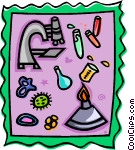Middle school to high school
By Mary Bigelow
Posted on 2014-09-10
 I’ve heard that there will be a vacancy in the high school science department next year. The position is for three sections of general biology and two sections of environmental science (not AP). I currently teach middle school general science but I’m credentialed in biology and tempted to make a change after 10 years. What culture shock would I experience in high school? How can I handle two different preparations?
I’ve heard that there will be a vacancy in the high school science department next year. The position is for three sections of general biology and two sections of environmental science (not AP). I currently teach middle school general science but I’m credentialed in biology and tempted to make a change after 10 years. What culture shock would I experience in high school? How can I handle two different preparations?
—M. fromTexas
I had a similar situation, switching to a high school position after many years at a middle school. I think my middle school experience gave me an off-beat sense of humor and helped me to deal with the high schoolers who needed different instructional approaches. Engaging high school students in spirited discussions and in high-level investigations and projects was intellectually exhilarating, although I must admit I still have a soft spot for middle schoolers. But I don’t regret taking on a rewarding challenge that enabled me to grow professionally and expand my circle of colleagues.
In terms of “culture shock,” you’ll find the students are physically bigger and they have a lot on their plates in addition to their academic classes: extracurriculars, social issues, interactions with their peers, after-school jobs, and concerns about college and post-high school employment. In many places, the high school starts earlier than the other schools. Access to social media can be a distraction during the day. You might not have a high percentage of parents at back-to-school night.
Unless you are already familiar with the school and the faculty, you may feel like a new teacher again. You might not be part of a team as you were at the middle school. Your lessons will have to include investigations and activities that are at a higher level of complexity.
My big “aha” was noticing how high school students have definite ideas of how things are supposed to be in school. If you deviate from that, you might have some pushback at first until they see the benefits. For example, if you require open-ended discussion or non-cookbook investigations, some students may complain “just tell us what to do.” In a fair, firm, and friendly style explain why you expect them to take more responsibility for their learning and how you will help them.
I actually enjoyed teaching more than one course. When I taught six sections of middle school science, I found that by the end of the day, it was hard to remember what we did in each class (I learned how to make quick annotations after each one). I had to draw on my acting and presentation skills to make the last period as interesting as the first, and I had to remember that even if I had heard a question five times already, to a student in the last class it was a new idea. I also appreciated the opportunity to update my own content and skills in more than one specialized area.
Another advantage of teaching more than one course is that—with careful planning—you can schedule tests, projects, student presentations, and notebook reviews at different times, spreading out the work instead of dealing with 150+ assignments at once.
There are many strategies you can use to keep yourself (and the students) organized. Try not to have to set up two different labs on the same day. Divide your bulletin boards and shelves into two separate areas so students in each course know where things are and where to turn in their assignments. I used a different logo for each of the three courses I taught, putting it in the upper right corner of handouts, quizzes, or other documents. I used separate three-ring binders and separate folders (with the same logo) on my laptop for each course to organize lesson plans and other resources. I even had a bag for each course to keep materials from getting mixed up when I took things home.
A huge asset is that you will know many of the students from their middle school years. You know what is and is not part of that curriculum and what most of them should already know or be able to do (with a bit of a refresher).
Some of our colleagues are forced into a change on short notice, so you’re fortunate to have input into this decision and time to think about it, visit the school, and review the curriculum. Good luck!
Disclaimer: The views expressed in this blog post are those of the author(s) and do not necessarily reflect the official position of the National Science Teaching Association (NSTA).


